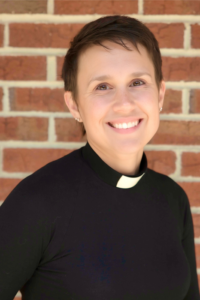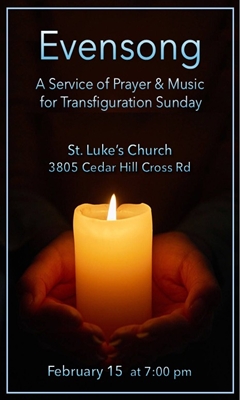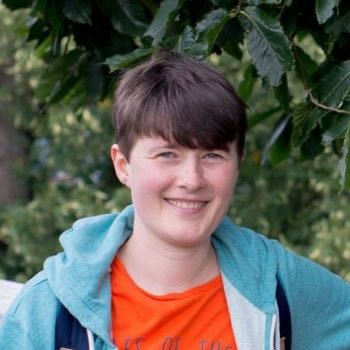
In September, the diocese welcomed Jenny Replogle as the canon for lay-led parishes and parishes in transition. Faith Tides editor Naomi Racz talked to Jenny about her early religious experiences, her journey to ordination, the joys and challenges of co-rectoring, her new role in the diocese and the challenges facing the Anglican church. This interview has been edited for clarity and brevity.
Naomi Racz: Could you tell me a bit about your background, where you grew up, what your surroundings were like, and a bit about your early religious influences?
Jenny Replogle: I grew up all over the place. We moved around every two or three years growing up, mostly around the South. I spent more time than anywhere though in Louisiana, outside New Orleans. I grew up Methodist until I was 11. And then, when we moved to Louisiana, my parents joined a Southern Baptist church and they put me at an evangelical Christian school. So, I grew up in an evangelical, Southern Baptist, conservative subculture through junior high and high school. It both deeply influenced my faith, but also left me in a place where I was always struggling and had questions. My faith was really important to me and I found Christianity really beautiful and compelling, and deeply cared about it, and struggled with a lot of what was being taught.
When I went to college, that all broke open. I went to a Southern Baptist college in Mississippi, and both seeing how racism was handled and how queer folks were treated really broke open things for me. I just got to the point that I couldn’t abide by how the church that I was in was treating people. At that time, I also worked in youth ministry and started to, I would say, feel a call. But I was really unsure about it because of what I was also seeing in church.
I worked in the nonprofit world for a little bit, I did AmeriCorps for a year, and then decided to go to seminary to see if there was a place in the church that I could live with integrity. I also wanted to hear different voices across the Christian spectrum. I went to Princeton for seminary and I did find that, and was really grateful for it. In the last couple of years I found the Episcopal Church. I had seen so many disagreements, and, so often, to think differently in the churches that I grew up with was a problem and was a reason to basically cast you out, or say that you didn’t fully believe. Whereas, in the Anglican tradition, we were made stronger by us being different and coming in with different backgrounds and beliefs. That was really beautiful to me and a vision of church that I could be part of. And so I joined the Episcopal Church and then eventually started the ordination process there.
NR: Could you tell me a bit about your career so far within the Anglican and Episcopal Church?
JR: Right as I was ordained, I was called back to Princeton, to the Episcopal church there, where I served as curate, and then associate rector, in a really large corporate parish — a 2000 member parish — with a couple of priests. It was a great place to start out and learn to be a priest. While I was there, I was put on a bishop search committee. Then, later on in my career, at my next job, I was made co-chair of another bishop search committee. So that’s been a big part of my career as well. I really loved being part of those conversations and figuring out where the fit was in ministry, and where we were all being called to use our gifts to serve and share in ministry together.
Jonathan [Thomas, rector of Christ Church Cathedral] and I realized that we really wanted to work together. And so, we discerned a call to be co-rectors and found a parish in Peoria, Illinois, to serve as co-rectors.
NR: I can’t imagine there are too many husband-wife co-rector teams. Why did you decide to work together in that way and what was it like?
JR: Some of that was because of the season in our life. We were having kids, so we thought it would just be better for us. But the more we talked about ministry, we found that we had really similar visions of church. This was a way to demonstrate and embody partnership. So much of the church is bound in hierarchy, especially in the US. Even though it shouldn’t be, we function in a hierarchy of clergy and lay people, rather than seeing clergy and lay people as partners in ministry.
And the place that we went was the most hierarchical place we’ve ever seen. And so it became more and more important to us to embody partnership and that ministry could be shared, and that sharing of ministry also happened between clergy and lay people, rather than having a top-down hierarchical way of leading a church. We have different roles, but different roles don’t make one higher than others. If we live out our different roles, we actually live out ministry in better ways. Being co-rectors, we tried to embody that for nine years. Sometimes we were more successful than others and it was always, always a learning process to figure out how to do it.
NR: Can you tell me a bit more about your specific role in the diocese and the kinds of things you’re going to be doing as part of that role?
JR: There’s two main areas of focus. One is lay-led parishes: those parishes that don’t have permanent or settled clergy, which is becoming more and more of our parishes. I think at one point we would have considered them vacant and waiting for a priest. But now we’ve accepted the reality that this is probably the way things are going forward.
And so instead of “how do we go back to the way things were?” we are asking “how do they become more faithful and healthy and effective as they are?” How do we support the ministry that they’re doing? Because these parishes are doing great ministry. How do we support that, and support the lay leaders there, and figure out what ministry looks like today in the context of those places? Now, all of them are in different places, many of them on different islands. And it’s going to look different for each place, but my job is to walk alongside them and help them figure out how to embody and live out their ministry more fully. And to figure out what supports they need, and how we get them those supports.
The other part is the parishes in transition, and that’s working with parishes that are in transition for any number of reasons. The main one being that their clergy are leaving, or have left, and they are calling new clergy. I’ll be developing profiles, posting jobs and working with candidates to find the best fit for those parishes. But also working with congregations that are in transition with their building. There’s any number of transitions places could be going through. I think transitions are really holy and they are a liminal time where we’re in between what we knew and what will come. And so we often open ourselves up to new ways of God working in us, and new possibilities.
There’s also grief involved in it. It’s really hard. It’s not just all hopeful and exciting. It’s this big mix of grief and hope, and often pain and struggle, and also possibility. That’s a really special time to get to walk with a congregation and also to be able to dream about what God is calling us to in the next phase of ministry.
NR: Will you be doing a lot of travelling around the island and going to different parishes?
JR: Yes. I’m really clear that I can only walk alongside people in ministry if I’m actually where they are, and know what they’re doing. Ministry isn’t an abstract thing that we do as a parish somewhere. We do it as particular people, in particular places. So it’s really important to me to be out where people are, to get to know their ministry and also to honor that they’re the experts in their ministry. I’m not the expert coming in from the outside. I’m someone who’s coming in to offer resources and tools, and support them.
NR: What do you see as some of the challenges facing the diocese and the wider Anglican church, and is that different between Canada and the US? Or do you see similarities there in terms of challenges that are being faced?
JR: I am sure there are differences. Like I was saying, ministries are only lived out in really particular contexts. So those contexts are different, but I would say, overall, the large challenges are pretty similar. That’s true, I would say, in the Western world.
We’re at a really big inflection point overall around Christianity and the church, and figuring out what it means to be the church today. Our world is increasingly secular, but also increasingly connected and sharing information in really different ways. We’ve seen the church change about every 500 years, largely with massive changes in communications. We have a church that’s mostly — and this is true of the Episcopal Church and the Anglican Church of Canada — structured for boomers in the fifties and sixties. And so much of how we do church is still based on that model, and that’s not the world we live in anymore. We have to figure out what it means, and there’s a lot of grief and loss involved in that. It’s really hard.
But it’s also full of opportunity. When Christianity is not the primary cultural thing that’s holding people together and people aren’t going to church because it’s the culturally right thing to do, we get freed up to actually talk about what it means to be the hands and feet of Jesus in the world, and what it means to be the body of Christ. It’s really exciting to be doing this work. There are challenges. But they’re exciting challenges because we get to dream of new ways of doing things, and figure out what it means to be the church today, in our world.



